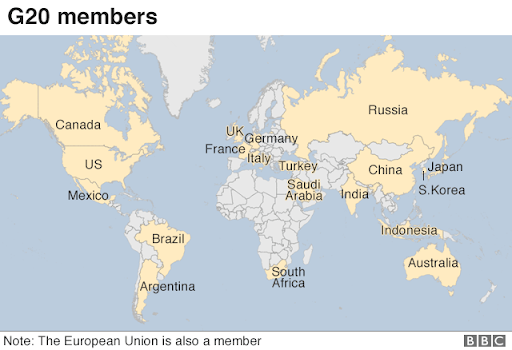Global Corporate Tax
Why in news?
- Recently, the heads of the world’s major economies—the Group of 20 (G20) nations has approved a new global minimum corporate tax.
- The deal, announced at the G20 summit in Rome, Italy, is “historic” since this is the first time nearly all nations have agreed to such a system.
Tax Avoidance: A menace
- The new deal was a bitterly fought battle over rampant tax evasion by multinational firms.
- Nations have been competitively adopting low tax regimes to attract investments that gave rise to what we know as “tax havens”.
- Tax Havens are countries/territories where corporate houses are registered in or operate from and around 90 per cent of the world’s top 200 companies have a presence in tax havens.
- According to current tax laws, companies pay taxes not at the place of economic activities, but at the tax havens where they are registered.
- Eg: A company might do business in India but it would not pay tax on profits made here since it is registered elsewhere.
- The International Monetary Fund estimates that the global revenue loss to governments due to this tax avoidance was between $200 billion and $600 billion in 2019.
- Corporations avoided tax massively by shifting $1.38 trillion worth of profit from the countries where they were generated to tax havens.
- Private tax evaders paid less tax than they should have by storing a total of over $10 trillion in financial assets offshore.
- According to the Tax Justice Network, this revenue loss would be around $500 billion, with lower-income countries losing around $200 billion.
- Eg: In 2019, there were 650 million poor people in the world living under the international poverty line of $1.9 per day.
- According to the Corporate Tax Haven Index 2021, prepared by the Tax Justice Network, the OECD countries that set the global tax rules were responsible for over two-thirds of global corporate abuse.
The New Bare Minimum
-
- G20 and G77, which represent a majority of the world’s nations and nearly the entire global economy, have approved a global minimum corporate tax that, OECD estimates, covers 90% of the global economy.
- The new Global tax deal aims to
- Prevent multinationals from paying low taxes (or no tax) by booking their profits in tax havens.
- Make Companies pay taxes wherever they operate or conduct business in, even if they do not have physical presence in the country.
- Under this deal, there are two “pillars” of taxation on corporations.
- i) Pillar I : The tax provision empowers countries to tax companies where they earn their revenue.
- Under this, companies’ excess profit–defined as in excess of 10 percent of total revenue will be taxed at 25 per cent.
- It is estimated to affect the world’s top 100 companies.
- ii) Pillar-II : Under this, there would be a global minimum tax rate of 15 %.
- It will be applicable to overseas profits of multinational firms with €750 million (about US $866 million) in sales globally.
- Government has the power to impose any local corporate Tax and if a company pays less than the 15 % tax, the government of its home country would have the power to levy a tax to bring it to the minimum rate.
- The new deal will significantly raise the taxable revenue and thus the tax.
- OECD estimates that with the new minimum rate, countries will have $150 billion annually in additional revenues.
- Countries will get to tax $125 billion of profit due to the provision of taxing wherever companies earn the profits.
- Thus, the reshuffling of tax revenue will level the playing field for developed and developing countries.
Status Quo
- The deal applies to a very small part of the corporate profits and is also limited to a few companies.
- Estimates show that the 25 % tax rate will result in $17 billion more annually for the 38 poorest countries than the 15 % rate.
- Many developing countries, though signatory to the deal, have expressed concerns about the implementation of these new taxing rules being conditioned upon them removing all unilateral taxes on technology companies.
- As per international non-profit Oxfam, the new tax regime will affect only 69 multinationals and would only apply on “super profits” above 10 per cent.
- The proposal for a fixed global rate of 15 % will overwhelmingly benefit rich countries and will increase inequality.
- The G7 and EU will take home two-thirds of new cash that it will bring in, while the world’s poorest countries will recover less than 3 %, despite being home to more than a third of the world’s population.”
- Thus, “The oecd’s repeated failure to deliver on its promises above all, the promise to be ‘Inclusive’ makes it imperative to bring the negotiations to the legitimate alternative.
About G20
- Founded in 1999, the Group of Twenty (G20) is the premier forum for its members’ international economic cooperation and decision-making.
- The G20 comprises Argentina, Australia, Brazil, Canada, China, European Union, France, Germany, India, Indonesia, Italy, Japan, Mexico, Russia, Saudi Arabia, South Africa, South Korea, Turkey, UK and USA.

- The G-20’s member-countries represent around 85% of the world’s economic output, three-quarters of international trade and two thirds of the world’s population.
- The objectives of the G20 are:
- Policy coordination between its members in order to achieve global economic stability, sustainable growth;
- To promote financial regulations that reduce risks and prevent future financial crises; and
- To create a new international financial architecture.
Subscribe
Login
0 Comments
